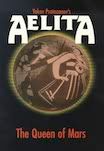1920s SF film

Aelita: The Queen of Mars, 1924, Russia DIRECTED BY YAKOV PROTAZANOV
I've never been one to criticise films of books that depart radically from the source material, but in the case of Aelita I had to get over some reservations about the differences between Tolstoy's book and the film before I could really enjoy it. For one, the novel has a good linear narrative, while the film provides a two-track story that merges towards the end; secondly, while the Martian scenes are indeed still memorable, the way the film focuses on considerably fleshing out the earthbound life of M.S. Los still feels a little overdone, but maybe that's because I'm still not used to fully appreciating silent cinema and the different structure of a screenplay that has to get its message across without the benefit of easy dialogue.
But now having watched Aelita several times I'm actually enthusiastic about it. It has good characterisation, comedy and political commentary alongside some well-depicted scenes of life in Soviet Russia. More importantly, it also provided a spectacular beginning for Soviet cinema - and gosh, it was science fiction too. Yes, it's actually a better and more enhanced story than the novel: what the book provides little of is given more attention here, ie. a detailed background into the motives of Los and Gusev before they head for Mars, this time with more company. This does makes the screenplay meander considerably before it gets to the journey to Mars itself (a whole hour and twenty-five minutes into the film), but the impressive Martian settings have already appeared quite early, as the Martians view life on Earth through their telescopes. Yakov Protazanov is, of course, making Mars a no-expense-spared treat for his viewers, in fact there's no doubt the Martian stage sets and costumes consistently provide the high points to the entire film.
But it's not all popcorn, as there's politics in the film too. Protazanov had, only the year before, returned to Russia from exile after the Russian Revolution, and his most radical departure from the book was to turn Aelita into a figurehead for rebellion against a dictatorship only to become a dictator herself. I'm reckoning this could be commentary on the Bolshevik Party and Lenin, who had died nine months before Aelita was released (and this was after all the same sentiment - how the Russian Revolution failed the people - that inspired Orwell to write Animal Farm). Other things I love about the film are the way it has preserved the tragic demeanour of the scientist M.S. Los (and actor Nikolai Tsereteli had a wonderfully appropriate face for the role), and even though the resolution has become one of the worst clichés of literature or film I actually don't mind it here because it genuinely takes you by surprise. Visually this is still a spectacular work of the imagination for early cinema - not as genre-defining as Metropolis, of course, but then few things are.